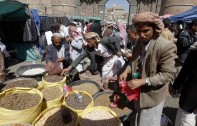
Yemen’s public Markets
By NY Staff
An economic report issued by the Economic Development Researches Center has confirmed that the political and security deterioration in the country is leading the economy to serious deterioration.
The report called on political powers to realize that the economy is moving towards deterioration and collapse rapidly, and in order to maintain the continuity of the current investment projects and control the economic indicators, they must accelerate the restoration of security, political, legal and economic stability.
The report noted that there is a significant decrease in the movement of economic activity; the stopping a lot of investment projects, the closure of a number of foreign companies and institutions as well as the moving of domestic capital to outside Yemen. “There is general concern haunting investors due to the deterioration of the political situation with no solutions in sight,” the report added.
The report excluded the existence of new investments and capital to Yemen this year or next year except the regional political investments, because investors are looking for a safe place for profit.
The report explained the importance of the psychological aspect of investors and depositors in local banks as the deterioration generates a feeling of anxiety, fear and lack of confidence in the local currency to the depositors, which will push them to withdraw their deposits and convert them to dollars. The deposits in local currency in commercial banks amounted to about 2.2 trillion riyals in December 2014. If it is withdrawn, it requires coverage of $10 billion, and commercial banks have only $2.1 billion, so they need $8 billion more that will be requested from the central bank, which had only $4 billion at the end of January 2015.
The report said that local banks are vulnerable to looting and theft by gangs, which has happened in some areas of Yemen, and that will force banks and exchange companies to shut down many branches.
The report pointed out that there is a decline in oil revenues estimated at $1.2 billion in 2014 if compared to 2013 due to oil pipeline bombings and threats to destroy oil installations. Also, the cash reserves of the Central Bank declined from $7 billion in 2011 to $4 billion at the end of January 2015. There are concerns about the foreign exchange depletion and fears of the international isolation in the coming days.
The report warned of the continuity of the political crisis, absence of security, instability, and the continued closure of foreign embassies in Sana’a all that will lead to the suspension of some foreign banks from their dealings with the Yemeni banks. This will stop a lot of money transfers in and out of Yemen, which will increase the difficulties and obstacles to trade between Yemen and the outside world, which amounted to about $21 billion in 2013.
Statistics indicated that the number of Yemeni expatriates abroad is more than 2 million, and Yemen occupies the seventh rank among Middle Eastern countries in remittances, which were about $3.5 billion in 2012, reflecting the importance of foreign remittances as a source of income for families and supplying the Yemeni economy with foreign exchange. The complex control procedures on remittances will have serious repercussions on families and negative effects on the Yemeni economy.
The report said that small and medium enterprises are also suffering from lower sales traffic to nearly half compared to the same period in previous years. Some couldn’t pay rent and were unable to pay wages and salaries to employees, reflecting on the decline in Yemeni families income that will force them to reduce their demands for goods and services, forcing producers and investors to reduce production and investments.
The report also pointed out that the unemployment rate rose before the February Revolution in 2011 from 25% to 36% and 44% in 2012 and 2013. It is expected that the unemployment rate is rising to more than 60% in 2015.
The report concluded that more than 50% of Yemeni income is less than one dollar a day, and it refers to the low income of citizens and the lack of savings and lower purchasing power. Poverty rates are estimated to be 50%, and more than 50% of the population does not have access to adequate food. This figure means that more than 12 million people suffer from food insecurity and malnutrition.
It also stressed that these indicators make the food problem more complicated day by day, which increases the suffering of the citizens. There could be a humanitarian disaster if the situation continues as it is.


